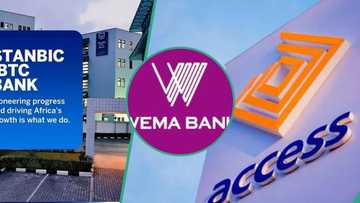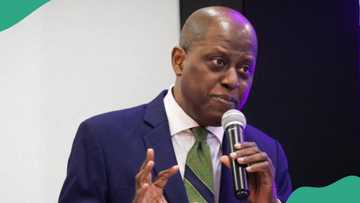CBN Sends Strong Message on Naira Scarcity as Nigerians Battle Cash Crunch
- The Central Bank of Nigeria has reiterated the availability of cash at various dispensing points across the country
- The bank said there are enough banknotes in Nigeria to support economic activities
- CBN said large withdrawals by banks and customers across the country cause scarcity
Pascal Oparada has over a decade of experience covering Tech, Energy, Stocks, Investments, and Economy.
As Nigerians battle near acute naira scarcity, the Central Bank of Nigeria (CBN) has said there is an adequate supply of currency.
The apex bank gave the assurance following the complaints by bank customers on the scarcity of banknotes at counters, ATMs, PoS, and Bureau de Change (BDCs).

Source: Twitter
CBN confirms enough cash for economic activities
A statement by the bank's Corporate Communications Department said there is no shortage of banknotes, stating there is enough for economic activities in the country.
Nigerian Tribune reports that CBN said the scarcity was caused by a large volume of cash withdrawals from its branches by commercial banks across the country.
The bank also said panic withdrawals by bank customers are partly responsible for the scarcity.
CBN's statement reads:
"The attention of the CBN has been drawn to reports of alleged scarcity of cash at banks, ATMs, PoS, and BDCs in some major cities across the country.
"Our findings reveal that the seeming cash scarcity in some locations is mainly due to high volume withdrawals from the CBN branches by DMBs and panic withdrawals by customers from the ATMs.
"While we note the concerns of Nigerians on the availability of cash for financial transactions, we wish to assure the public that there is sufficient stock of currency notes for economic activities in the country.

Read also
NIBBS to remove Flutterwave, other non-deposit financial institutions from fund transfer channels
"The branches of the CBN across the country are also working to ensure the seamless circulation of cash in their respective states of operation," it said.
CBN advises Nigerians to explore alternative payment solutions
The bank asked Nigerians to stop panic withdrawals as there was enough cash to go around and support economic activities.
It asked Nigerians to explore alternative payment methods to reduce pressure on other touchpoints.
The development comes as Point of Sale (PoS) operators returned to buying cash from traders and petrol station attendants as banks ran out of money.
Also, commercial banks have imposed withdrawal limits on various ATM points across Nigeria.
PoS operators consider a hike in charges
PoS operators said that they returned to cash-buying following cash scarcity that is threatening to return to the pre-naira redesign era, Legit.ng reported.
The development has led to operators increasing their transaction charges by 100% from N100 to N200 for cash of N5,000.
A PoS operator in the Iju-Ishaga area of Lagos, Mike Oyewole, told Legit. ng that all the operators in the area have increased their charges as they find it challenging to access cash from normal banking channels.
"I queued at the ATMs at Fagba for over an hour before I could get some cash. Of all the eight ATM points in the area, only four were dispensing.
"We are now patronizing petrol attendants and traders as we did in January and February this year," Oyewole said.
CBN issues strong warning as fake naira notes circulate Nigeria few days to Christmas
Legit.ng reported that the Central Bank of Nigeria (CBN) has warned individuals involved in the circulation of counterfeit banknotes to desist from the criminal act or face prison time.
It said this in a statement signed by Sidi Ali, the CBN's Acting Director for Corporate Communications, on Friday, December 8, 2023. This comes as Nigerians are stocking up items from the market in preparation for Christmas and the new year, amid the renewed naira scarcity that has affected many states in the country.

Read also
CBN speaks as PoS Operators Consider Hike in Charges, Resort to Naira Buying as Cash Scarcity Bites
The apex bank noted that counterfeit banknotes are being circulated in the food markets and other commercial centres across major cities in the country.
PAY ATTENTION: Donate to Legit Charity on Patreon. Your support matters!
Source: Legit.ng




